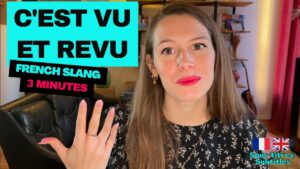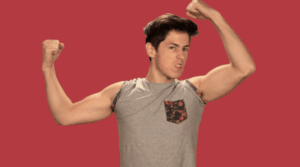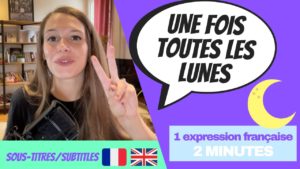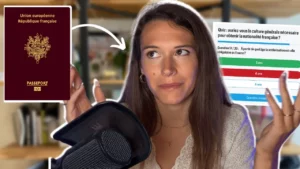Transcript
If you don't want to see, you have to hide your eyes.
I could look at the Eiffel Tower for hours because it is so beautiful. I'm seeing someone right now. You mean you have a lover.
Hi everyone! Welcome to this new French video. I hope you are motivated. I hope you are all doing well. Today we are going to talk about the difference between look and see.
I know that these two verbs can be a bit confusing and that there are many people who are learning French or even who have been speaking French for several years, who will confuse these two verbs. It's a bit like hearing and listening. I don't know if you remember, but a few weeks ago, I made a video on this topic. Well, it's exactly the same as looking and seeing.
🇫🇷 This course will unlock your oral comprehension of French
👉 Through dialogues, I'll teach you to understand the French, even when they talk fast.
🚀 60 everyday dialogues to boost your understanding of French
✅ Understand the French, even when they're talking fast.
✅ Talk with French speakers with confidence.
✅ Improve your French for good with a method based on everyday dialogues.
In both cases, images will come to our eyes, but there is a difference in action. One of these two verbs is actually passive and the other is rather active.
We're going to go through this together. And of course, as usual, I'm going to give you some examples so you can better understand and not make this mistake anymore if it's a mistake you make regularly.
If you are new to this channel, I am Elisabeth. Every week, I post videos to help you progress in French. So don't forget to subscribe if you don't want to miss any of my videos.
Let's start with the verb "to see". When you see something, it is that an image comes to you. You are not in a process, it is really the image that comes by itself in your eyes. If you don't want to see, you have to hide your eyes. Because even if you don't want to see this image, it will come into your eyes no matter what.
So you are passive. For example, I can say "I saw my neighbor fall down the stairs. Obviously, it was not a choice to see this action. I see the Eiffel Tower from my window. It's like this. Through your window, there is an image of the Eiffel Tower.
On the other hand, when we look, we are active, we choose to see, we want to see. To look, we will therefore make an effort. I heard some noise outside. I'm going to look out the window to see what's going on. I love watching my son play soccer. I could look at the Eiffel Tower for hours because it is so beautiful.
I'll give you examples with both verbs used so that you understand the difference in nuance. Look, Cynthia and Julian are kissing. I see, it's in front of my eyes. I don't have to make an effort to look. I can see the Eiffel Tower from my window and I never tire of looking at it.
There are cases where it is a little more complex. Depending on the context, so what we really want to say, we will use one or the other. This is particularly the case with movies, series, shows where we will sometimes use "watch" and sometimes "see".
Let me explain. Most of the time, we will use the verb "to watch" with a video content. For example, I watched "The Voice" on Saturday night on television. Or I watch when Harry meets Sally tonight. However, if you want to talk about the experience of having watched a movie, a series, a show, that you want to mean that the experience is actually acquired for you, then you are going to use the verb see.
I'll give you some examples and it will be easier. Do you know the series "Ten percent"? Yes, I've seen it before. So you understand here, you mean more like it's validated, it's an experience that you've accomplished.
Did you see Almodovar's last film? Yes, I went to see it in the cinema. So you're not talking so much about the action as such of having watched the film, but as I tell you about the experience. Now let's go a little further, with the verb "to see" that you can use as a synonym of other verbs.
First, "see" you can use as a synonym for distinguish or notice.
See the red house over there? Here we use see because it is a synonym for distinguish. Did you see the lightning in the sky? There's a big storm. So again, it's a synonym for distinguish. Do you see anything new in my living room? Again, it's more like do you notice, do you distinguish something new?
But seeing is also used in everyday life. This expression is used a lot to mean that we meet someone. For example, I can say I'm seeing my sister tonight. It means that you have a date with her. Tonight I'm going to see my grandmother in the hospital.
But also, when you say "I'm seeing someone right now," so I'm seeing someone right now, you mean you have a lover for example. You are not necessarily in love. It means that you're going out with this guy or with this girl, or that you see each other often, you have a special relationship with this person.
Let's go a little further with the verb "to look" which can also be used as a synonym for other verbs.
"Look" can mean, look for in some contexts. Do you have any sugar? I'll look in the drawer. It means I'll look. I'm not sure if I have any, I'll look.
Could you give me Diego's phone number? I'll look it up in my phone and send it to you. So I'll look in my phone and send it to you.
That's it for today. I hope you enjoyed this video and that you understood the distinction between looking and seeing.
I'll see you soon. And of course, don't forget, please put a "like" to the video, you know it helps me a lot.
See you soon.








